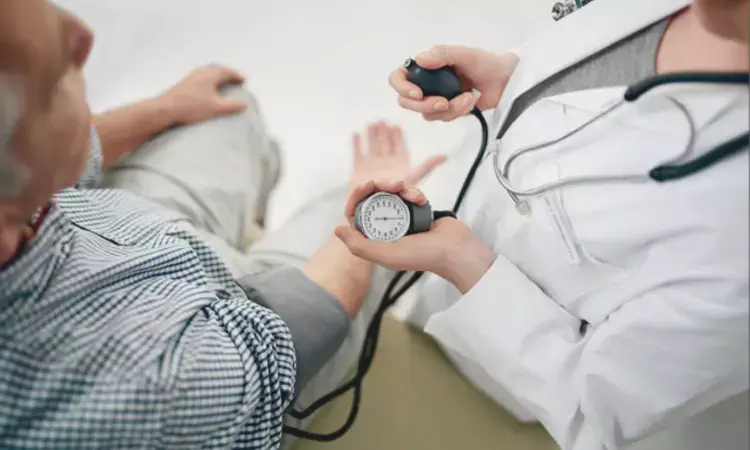- Home
- Medical news & Guidelines
- Anesthesiology
- Cardiology and CTVS
- Critical Care
- Dentistry
- Dermatology
- Diabetes and Endocrinology
- ENT
- Gastroenterology
- Medicine
- Nephrology
- Neurology
- Obstretics-Gynaecology
- Oncology
- Ophthalmology
- Orthopaedics
- Pediatrics-Neonatology
- Psychiatry
- Pulmonology
- Radiology
- Surgery
- Urology
- Laboratory Medicine
- Diet
- Nursing
- Paramedical
- Physiotherapy
- Health news
- Fact Check
- Bone Health Fact Check
- Brain Health Fact Check
- Cancer Related Fact Check
- Child Care Fact Check
- Dental and oral health fact check
- Diabetes and metabolic health fact check
- Diet and Nutrition Fact Check
- Eye and ENT Care Fact Check
- Fitness fact check
- Gut health fact check
- Heart health fact check
- Kidney health fact check
- Medical education fact check
- Men's health fact check
- Respiratory fact check
- Skin and hair care fact check
- Vaccine and Immunization fact check
- Women's health fact check
- AYUSH
- State News
- Andaman and Nicobar Islands
- Andhra Pradesh
- Arunachal Pradesh
- Assam
- Bihar
- Chandigarh
- Chattisgarh
- Dadra and Nagar Haveli
- Daman and Diu
- Delhi
- Goa
- Gujarat
- Haryana
- Himachal Pradesh
- Jammu & Kashmir
- Jharkhand
- Karnataka
- Kerala
- Ladakh
- Lakshadweep
- Madhya Pradesh
- Maharashtra
- Manipur
- Meghalaya
- Mizoram
- Nagaland
- Odisha
- Puducherry
- Punjab
- Rajasthan
- Sikkim
- Tamil Nadu
- Telangana
- Tripura
- Uttar Pradesh
- Uttrakhand
- West Bengal
- Medical Education
- Industry
Finerenone Proven Effective in Reducing Heart Failure Events Across Genders in FINEARTS-HF Trial

UK: In a secondary analysis of the FINEARTS-HF randomized clinical trial, researchers found that finerenone, a novel non-steroidal mineralocorticoid receptor antagonist, significantly reduced the risk of heart failure (HF) events and cardiovascular death in both women and men with heart failure with mildly reduced or preserved ejection fraction (HFmrEF or HFpEF).
The findings, published in JAMA Cardiology, suggest that finerenone not only improves outcomes but also offers consistent safety and tolerability across both genders.
Heart failure with mildly reduced or preserved ejection fraction is more common in women, making the results of this study particularly significant for female patients. Traditionally, heart failure with reduced ejection fraction (HFrEF) has received more attention in clinical trials, leaving a gap in evidence for HFmrEF and HFpEF, conditions that are increasingly recognized as important contributors to heart failure-related morbidity and mortality, particularly in older populations.
Sex plays a role in the clinical presentation, outcomes, and treatment response in heart failure (HF) patients. However, there is limited knowledge regarding the safety and efficacy of finerenone treatment based on sex. To fill this knowledge gap, Misato Chimura, British Heart Foundation Cardiovascular Research Centre, University of Glasgow, Glasgow, United Kingdom, and colleagues aimed to evaluate the efficacy and safety of finerenone compared to placebo in both women and men.
For this purpose, the researchers conducted prespecified analyses in the phase 3 FINEARTS-HF trial, held across 653 sites in 37 countries. The trial involved adults aged 40 or older with symptomatic heart failure and an LVEF of 40% or higher, randomized between September 2020 and January 2023. Participants received either finerenone (20 mg or 40 mg) or placebo. The primary outcome was a composite of cardiovascular death and total heart failure events, including unplanned hospitalizations or urgent visits.
Key findings:
- A total of 6001 patients were randomized in FINEARTS-HF, with 45.5% women and a mean age of 73.6 years.
- Women had higher rates of obesity, higher LVEF (54.6% vs. 50.9% for men), and lower estimated glomerular filtration rate (59.7 versus 64.1 for men).
- Women also had worse New York Heart Association functional class and lower Kansas City Cardiomyopathy Questionnaire-Total Symptom Scores (62.3 versus 71.0 for men).
- The incident rate of the primary outcome was slightly lower in women (15.7 versus 16.8 in men) per 100 person-years.
- Finerenone reduced the risk of the primary endpoint similarly in women (rate ratio 0.78) and men (rate ratio 0.88) with no significant interaction.
- Consistent effects were observed for the components of the primary outcome and all-cause mortality.
- The mean increase in KCCQ-TSS from baseline to 12 months was greater with finerenone in both sexes.
- Finerenone had similar tolerability in both women and men.
In this secondary analysis of the FINEARTS-HF randomized clinical trial, finerenone reduced the risk of the primary composite outcome, including total (first and recurrent) heart failure events and cardiovascular death, while also improving symptoms in both women and men.
"The study found that finerenone demonstrated similar tolerability in both genders. Given that heart failure with mildly reduced or preserved ejection fraction is more common in women, these findings highlight the particular relevance of finerenone’s consistent efficacy and safety for female patients," the researchers concluded.
Reference:
Chimura M, Wang X, Jhund PS, et al. Finerenone in Women and Men With Heart Failure With Mildly Reduced or Preserved Ejection Fraction: A Secondary Analysis of the FINEARTS-HF Randomized Clinical Trial. JAMA Cardiol. Published online November 17, 2024. doi:10.1001/jamacardio.2024.4613
Dr Kamal Kant Kohli-MBBS, DTCD- a chest specialist with more than 30 years of practice and a flair for writing clinical articles, Dr Kamal Kant Kohli joined Medical Dialogues as a Chief Editor of Medical News. Besides writing articles, as an editor, he proofreads and verifies all the medical content published on Medical Dialogues including those coming from journals, studies,medical conferences,guidelines etc. Email: drkohli@medicaldialogues.in. Contact no. 011-43720751


